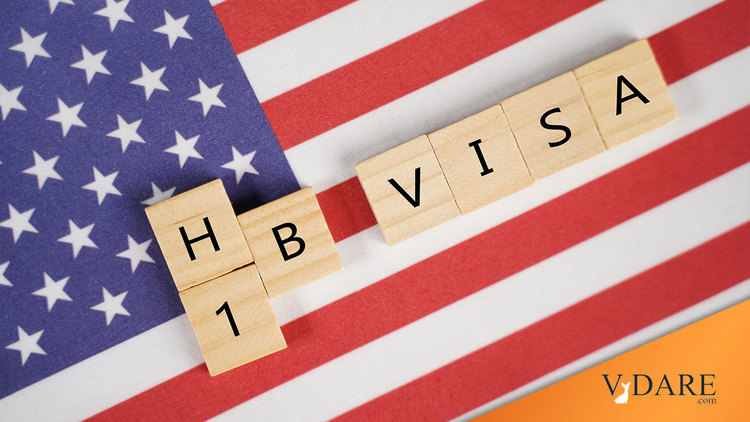
02/11/2009
Dr. Norm Matloff writes
As many of you will recall, last week I reported on the Sanders/Grassley amendment to the economic stimulus package now being considered in Congress. See here.The amendment, which passed unanimously in a voice vote, would place certain restrictions on hiring of H-1Bs by financial institutions receiving TARP bailout money.
The industry lobbyists, most notably the American Immigration Lawyers Association (AILA), apparently lobbied strongly against the amendment last week, succeeding in greatly weakening it. Originally the measure placed a flat ban on H-1B hiring by the TARP recipients, but in final form it merely imposed the same restrictions on them that currently apply to the H-1B dependent employers. As I will explain below, that represented a major weakening of the amendment, but according to the article enclosed below, the AILA et al are still not satisfied, and are pushing for the amendment to be deleted from the bill. [Groups fight stimulus limit on workers with H-1B visas,By Chris Strohm, CongressDaily 02/10/2009]
The major restrictions to which H-1B dependent employers are subject are (a) Americans must be given hiring priority over H-1Bs and (b) employers are not allowed to hire H-1Bs within 90 days before or after a layoff. General H-1B employers do not have these restrictions, but the Sanders/Grassley amendment would extend them to TARP recipients.
This would be a step toward implementing a portion the provisions of the excellent Durbin/Grassley H-1B reform bill introduced in the last Congress, which would have extended the H-1B dependency restrictions to all H-1B employers. I strongly endorsed that bill, because I approve of that portion of the Durbin/Grassley bill, though I regarded the prevailing wage reform part of the bill to be its most important feature.
After I made the above posting to this e-newsletter, a number of readers e-mailed me with comments pointing out that the TARP recipients could still hire from the bodyshops, thus circumventing the intent of Sanders/Grassley. I had not mentioned that in my posting, as I had assumed it would be obvious, as are other ways of getting around the restrictions, such as hiring L-1s; but of course it is an issue. Though I believe there is too much emphasis on the bodyshops in the H-1B debate, they are definitely important, but I will leave that issue to a major posting on it that I currently have in preparation.
You might ask, though, if the TARP recipients are going to get access to foreign workers through the bodyshops anyway, which they already do in sizable numbers, why would the AILA be so worried? The answers to this question are quite significant.
First, the bodyshops hire H-1Bs in bulk, and likely do so with a pretty small set of lawyers. Indeed, one can use a single H-1B application to request permission to hire many H-1Bs. So, when the bodyshops hire H-1Bs, only a tiny percentage of AILA members get any business. Second, unlike many other employers, bodyshops sponsor very few of their H-1Bs for green cards. Since a lawyer charges five or six times as much for green card applications as for H-1B cases, that again is quite a loss in income for AILA members.
But even those considerations pale in comparison to the core issue, which I believe is the historic, symbolic significance of the Sanders/Grassley amendment. For the first time since the establishment of the H-1B program in 1990, a house of Congress (the Senate here) has gone on record as characterizing H-1B to be a Bad Thing. The amendment puts H-1B on par with exhorbitant salaries for CEOs who run their companies into the ground, and with the purchasing of cheap foreign steel.
The statements made by those who want to limit TARP recipient CEO salaries, including Pres. Obama, are along the lines of, "Normally we would consider those high salaries for poor work to be stupid but well within the rights of boards of directors to pay them, but we draw the line when taxpayers' money is involved." The Sanders/Grassley amendment’s analog of this statement would be, "We've been reluctantly allowing you to hire H-1Bs instead of Americans, but no way will we let you do this if you're receiving a taxpayer bailout." In other words, the Sanders/Grassley amendment is an admission that H-1B is fundamentally wrongheaded.
The amendment also is an admission by the Senate that H-1B is about cheap labor, by analogy with the proposals that recipients of the stimulus package funds not be allowed to buy cheap foreign steel. Though Congress has implicitly admitted that the bodyshops hire H-1Bs for the purpose of acquiring cheap labor, it has never admitted that this is true for mainstream firms too. By imposing limits on big, household name financial institutions regarding H-1Bs, the Senate is tacitly admitting that they too use the H-1B program for cheap labor.
(I've of course written about this at length. Some of the mainstream firms may hire a higher class of workers, but they still pay them less than comparable Americans.)
Seems to me that this symbolism is huge. I believe the lobbyists may go all out to get the amendment deleted, or at least get it greatly watered down. They may, for example, push for an exception for foreign workers who have graduate degrees from U.S. universities. As I've written before, such an exemption would NOT be justified — most such workers are of only moderate talent, and employers can hire the few exceptions through the O-1 visa program — but sadly, pushing this Education Button has usually proved effective with gullible people on the Hill. One way or the other, this amendment does not seem likely to remain intact, and will likely be deleted altogether.
It will be interesting to watch.
Norm
This is a content archive of VDARE.com, which Letitia James forced off of the Internet using lawfare.